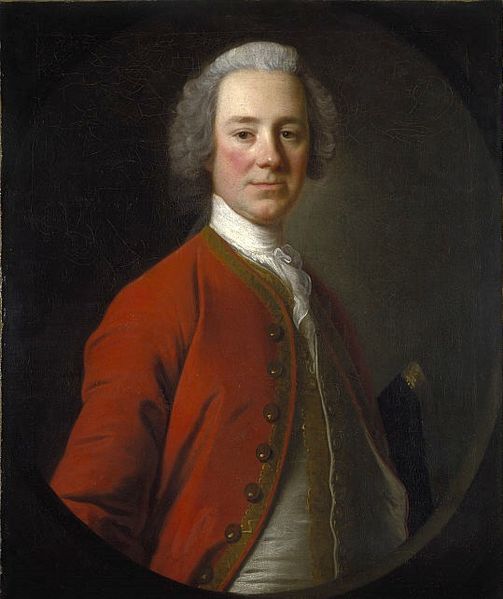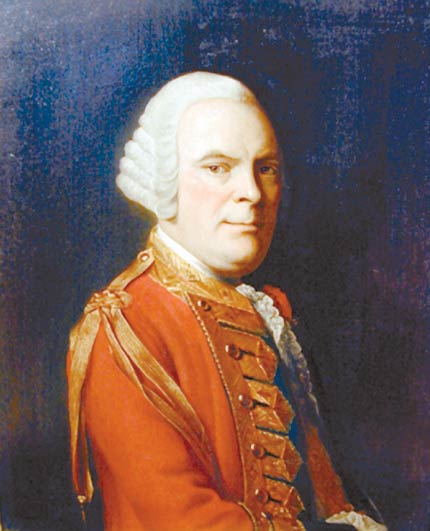<Back to Index>
- Major General of the British Army John Campbell, 4th Earl of Loudoun, 1705
- Major General of the British Army James Abercrombie, 1706
PAGE SPONSOR

Major General John Campbell, 4th Earl of Loudoun (5 May 1705 – 27 April 1782) was a British nobleman and army officer.
Campbell inherited the peerage on the death of his father in 1731, becoming Lord Loudoun. The earl raised a regiment of infantry that took part in the Jacobite Rising of 1745 on the side of the Hanoverian government. The regiment consisted of twelve companies, with Loudoun as colonel and John Campbell (later 5th Duke of Argyll) as lieutenant colonel. The regiment was raised and served in several different parts of Scotland; three of the twelve companies, raised in the south, were captured at Prestonpans. Eight companies, under the personal command of Lord Loudoun, were stationed in Inverness. Loudoun set out in February 1746 with this portion of his regiment and several of the Independent Companies in an attempt to capture the Jacobite pretender, Prince Charles Edward Stuart. The expedition was ignominiously defeated by a small number of Jacobites in what became known as the Rout of Moy. After this debacle, Loudoun fell back to join the Duke of Cumberland's army, giving up the town of Inverness to the rebels.
In 1756 Loudoun was sent to North America as Commander - in - Chief and Governor General of Virginia, where he was unpopular with many of the colonial leaders. When he learned that some merchants were still trading with the French, while he was trying to fight a war against them, he temporarily closed all American ports. Despite his unpopularity, the county of Loudoun, which was formed from Fairfax in 1757 was named in his honor. As Commander - in - Chief, he planned an expedition to seize Louisbourg from the French in 1757 but called it off when intelligence (possibly including a French military deception) indicated that the French forces there were too strong for him to defeat. While Loudoun was thus engaged in Canada, French forces captured Fort William Henry from the British, and Loudoun was replaced by James Abercrombie and returned to London.
On 23 January 1773, the town of Loudon, New Hampshire was incorporated and named in Campbell's honor.
In 1762 he was sent to Portugal to counter the Spanish invasion of Portugal as second - in - command, and he became overall commander in 1763. Despite being unable to prevent the loss of Almeida, the British forces soon launched a counter attack that drove the invaders back across the border.
A bachelor, Loudoun was succeeded as earl by his cousin, James Mure - Campbell.

General James Abercrombie or Abercromby (1706 – April 23, 1781) was a British Army general and commander - in - chief of forces in North America during the French and Indian War, best known for the disastrous British losses in the 1758 Battle of Carillon.
Abercrombie was born in Glassaugh, Banffshire, Scotland, to a wealthy family, and purchased a major's commission to enter the army in 1742. He was promoted to colonel in 1746, and major general in 1756.
Abercrombie commanded a brigade at Louisbourg in 1757 and became commander - in - chief of the British forces in North America after the departure of John Campbell in March 1758.
That summer, he led an expedition against Fort Carillon (later known as Fort Ticonderoga). Abercrombie was a genius at organization, but vacillated in his leadership to the point where his troops called him Mrs. Nanny Cromby. He managed the remarkable feat of assembling 15,000 troops and moving them and their supplies through the wilderness. Then, on July 8, he directed his troops into a frontal assault on a fortified French position, without the benefit of artillery support. More than 2,000 men were killed or wounded. Eventually his force panicked and fled, and he retreated to his fortified camp south of Lake George. This disaster caused his replacement by General Jeffrey Amherst and his recall to Great Britain in 1759. On his return to Britain, he sat as a member of parliament, and supported the coercive policy toward the American colonies.